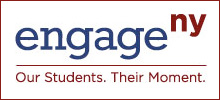8.3 - Expansion and Imperialism
From EngageNY
Beginning in the second half of the 19th century, economic, political, and cultural factors contributed to a push for westward expansion and more aggressive United States foreign policy.8.3a Continued westward expansion contributed to increased conflicts with Native Americans.
- Students will examine the effects of the transcontinental railroad on the movement toward westward expansion.
- Students will examine examples of Native American resistance to the western encroachment, including the Sioux Wars and the flight and surrender of Chief Joseph and the Nez Perce.
- Students will examine United States and New York State policies toward Native Americans, such as the displacement of Native Americans from traditional lands, creation of reservations, efforts to assimilate Native Americans through the creation of boarding schools, the Dawes Act, and the Indian Reorganization Act and the Native Americans’ various responses to these policies.
- Students will examine examples of yellow journalism that contributed to United States entry into the Spanish-American War, including the portrayal of the sinking of the USS Maine.
- Students will explain how the events and outcomes of the Spanish-American War contributed to the shift to imperialism in United States foreign policy.
- Students will examine the purpose and effects of the Open Door Policy.
- Students will evaluate the United States actions taken under the Roosevelt Corollary and their effects on relationships between the United States and Latin American nations, including the building of the Panama Canal.
Learn more on Engage NY
EngageNY.org is developed and maintained by the New York State Education Department (NYSED) to support the implementation of key aspects of the New York State Board of Regents Reform Agenda.
This is the official web site for current materials and resources related to the Regents Reform Agenda. The agenda includes the implementation of the New York State P-12 Common Core Learning Standards (CCLS), Teacher and Leader Effectiveness (TLE), and Data-Driven Instruction (DDI). EngageNY.org is dedicated to providing educators across New York State with real-time, professional learning tools and resources to support educators in reaching the State’s vision for a college and career ready education for all students.














